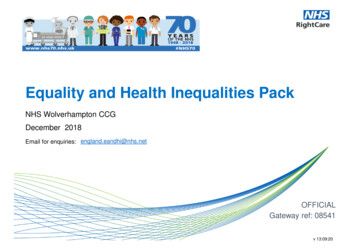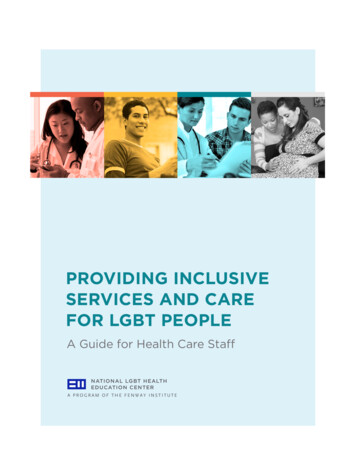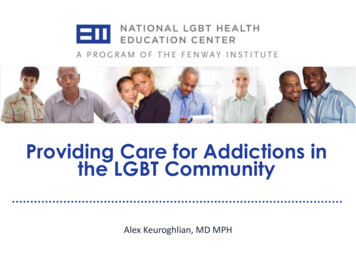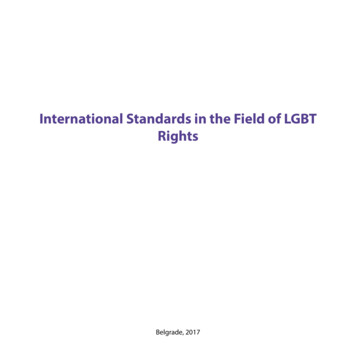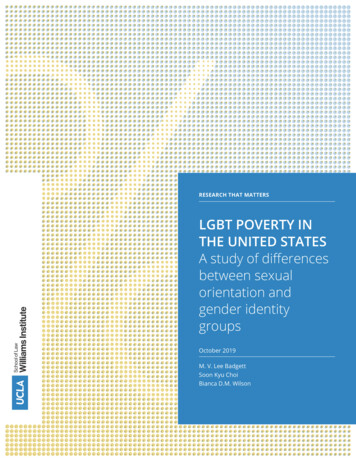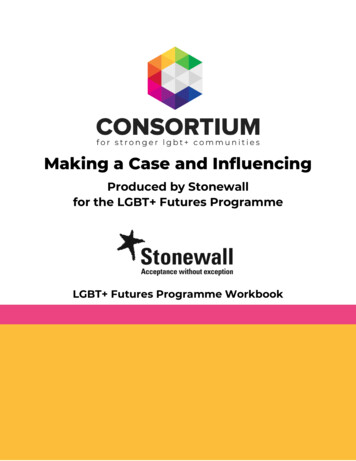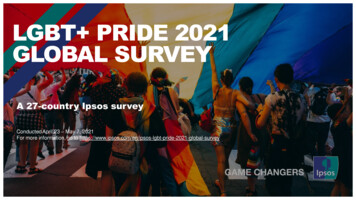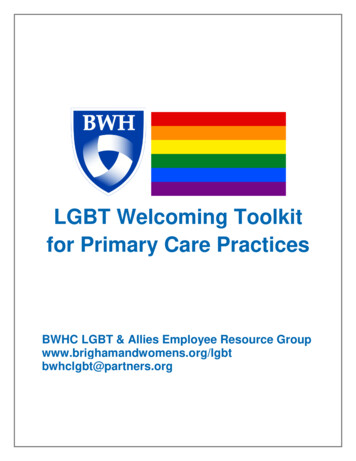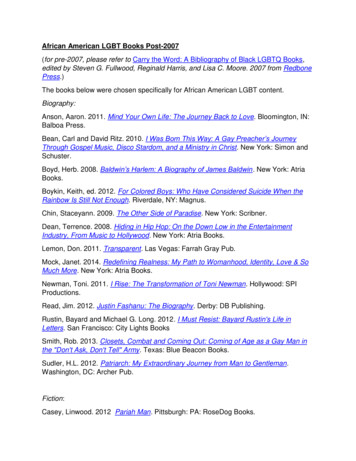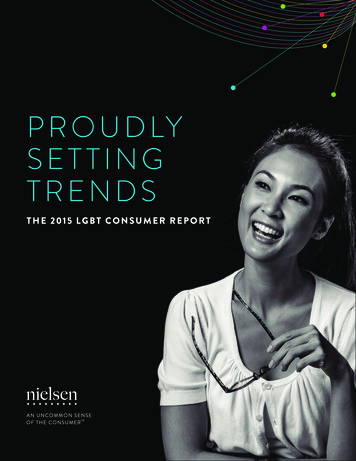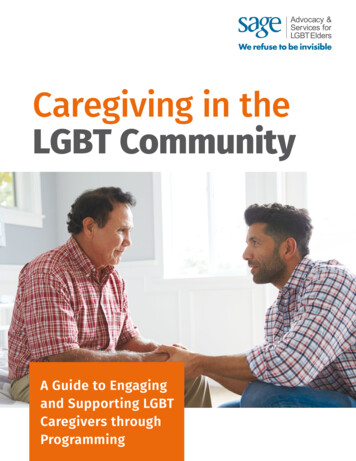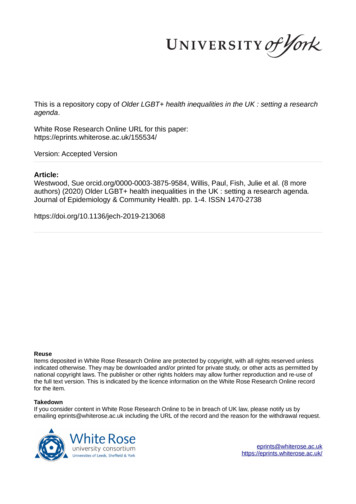
Transcription
This is a repository copy of Older LGBT health inequalities in the UK : setting a researchagenda.White Rose Research Online URL for this on: Accepted VersionArticle:Westwood, Sue orcid.org/0000-0003-3875-9584, Willis, Paul, Fish, Julie et al. (8 moreauthors) (2020) Older LGBT health inequalities in the UK : setting a research agenda.Journal of Epidemiology & Community Health. pp. 1-4. ISSN euseItems deposited in White Rose Research Online are protected by copyright, with all rights reserved unlessindicated otherwise. They may be downloaded and/or printed for private study, or other acts as permitted bynational copyright laws. The publisher or other rights holders may allow further reproduction and re-use ofthe full text version. This is indicated by the licence information on the White Rose Research Online recordfor the item.TakedownIf you consider content in White Rose Research Online to be in breach of UK law, please notify us byemailing eprints@whiterose.ac.uk including the URL of the record and the reason for the withdrawal terose.ac.uk/
Older LGBT Health Inequalities in the United Kingdom: Setting aResearch AgendaSue Westwood1, Paul Willis2, Julie Fish3, Trish Hafford-Letchfield4, JoannaSemlyen5, Andrew King6, Brian Beach7, Kathryn Almack8, Dylan Kneale9, MichaelToze10 and Laia Becares11Corresponding Author:Dr Sue Westwood, York Law School, University of York, LMB/258, Law and ManagementBuilding, Freboys Lane, York, YO10 5GD, UK.E-mail: sue.westwood@york.ac.ukWord count: 1559 words1York Law School, University of York, UKSchool for Policy Studies, University of Bristol, UK3School of Applied Social Sciences, De Montfort University, UK4School of Social Work & Social Policy, University of Strathclyde, UK5Norwich Medical School, University of East Anglia, UK6Department of Sociology, University of Surrey, UK7International Longevity Centre UK (ILC-UK)8School of Health and Social Work, University of Hertfordshire, UK9UCL Institute of Education, University College London10Lincoln Medical School, University of Lincoln, UK11Social Work and Social Care, Data Intensive Science Centre, University of Sussex, UK2
Journal Epidemiology and Community Health 2020 (in press)Older LGBT Health Inequalities in the United Kingdom: Setting a Research AgendaAbstractLesbian, gay, bisexual and trans a (LGBT ) people report poorer health than the general populationand worse experiences of healthcare particularly cancer, palliative/end-of-life, dementia and mentalhealth provision. This is attributable to: a) social inequalities, including ‘minority stress’; b) associatedhealth-risk behaviours (e.g. smoking, excessive drug/alcohol use, obesity); c) loneliness and isolation,affecting physical/mental health and mortality; d) anticipated/experienced discrimination and e)inadequate understandings of needs among healthcare providers. Older LGBT people are particularlyaffected, due to the effects of both cumulative disadvantage and ageing. There is a need for greater andmore robust research data to support growing international and national government initiatives aimedat addressing these health inequalities. We identify seven key research strategies: 1) Production of largedatasets; 2) Comparative data collection; 3) Addressing diversity and intersectionality among LGBT older people; 4) Investigation of healthcare services’ capacity to deliver LGBT affirmative healthcareand associated education and training needs; 5) Identification of effective health promotion and/ortreatment interventions for older LGBT people, and sub-groups within this umbrella category; 6)Development an (older) LGBT health equity model; 7) Utilisation of social justice concepts to ensuremeaningful, change-orientated data production which will inform and support government policy,health promotion and healthcare interventions.Key words: Health Inequalities; Social Determinants; sexual orientation; gender identity;ageingIntroductionThe United States (US) has led the way in establishing a lesbian, gay, bisexual and trans (LGBT )a health inequalities research agenda1 but there is still much to be done worldwide.LGBT people report poorer health than the general population and worse experiences ofhealthcare particularly cancer2, palliative/end-of-life3, dementia4 and mental healthprovision5,6. Their poorer health may be attributable to: a) social inequalities, including‘minority stress’7, i.e. the cumulative effects of lifelong exposure to prejudice anddiscrimination; b) health-risk behaviours (e.g. comparatively greater smoking, excessivedrug/alcohol use and obesity than non-LGBT people) linked to stress adaptation; c) loneliness1
Journal Epidemiology and Community Health 2020 (in press)and isolation, affecting physical/mental health and mortality.8 Healthcare experiences areassociated with anticipated/experienced discrimination and inadequate understandings of needsamong healthcare providers.9In Europe, there is growing governmental interest in promoting an LGBT health inequalitiesresearch agenda10,11 but no specific reference to older LGBT people (i.e. those aged 50 ).This is even though they are more likely to be users of healthcare services and there being arange of health inequalities specific to their lives12. Indeed, older LGBT people are affectedby both ageing issues common to all older people and issues specific to LGBT ageing13.The generic ageing issues they share with all older people include 14: biological ageing‘associated with the gradual accumulation of a wide variety of molecular and cellular damage’leading to ‘a gradual decrease in physiological reserves, an increased risk of many diseases,and a general decline in the capacity of the individual’ ultimately resulting in death. Althoughmore people are living for longer and into ‘older’ old age, many are doing so with increasingphysical and/or cognitive abilities and associated functional challenges. These in turn meanthat many may need support with activities of everyday living (ADLs)15 especially in older oldage and may become reliant on others for informal and/or formal care and support. Many olderpeople face living with unmet care and support needs16. These issues affect older people indifferent ways and at different stages of ageing. A great many economic, cultural andpsychosocial factors affect the extent to which an older person is able to age ‘well’ or not.Older age also involves changes in social roles and social status, and the need to deal with theloss of (ageing) friends and loved-ones.14 Loneliness and isolation can be one of the perils ofolder age, impacting physical and mental wellbeing and ultimately morbidity. 17 On the otherhand, shifting motivations, priorities and psychological perspectives can also mean that olderage can be a time of subjective well-being for many older people.142
Journal Epidemiology and Community Health 2020 (in press)In addition to these generic ageing issues, older LGBT people are also affected by how theirminority sexualities and/or gender identities intersect with ageing. They are more likely thanthe majority ageing population to live alone, to be childfree (especially older gay men), andestranged from their biological families. 18 While many have ‘families of friends’19 these areoften of the same generation, developing increased care needs at the same time and being lessable to provide reciprocal care. Older gay and bisexual men are deeply affected by HIV/AIDS,through loss of friends in previous decades and increasing numbers with HIV living longer ontreatments20. Older cisgender lesbian and bisexual women live longer than men, but withgreater disabilities and age-related health conditions21. Older trans people are concerned aboutthe possible need for personal care if their bodies are not congruent with a binary genderidentity and also of being mis-gendered if they lose mental capacity22. Older LGBT people,especially older bisexual and trans people are more likely to have a history of poor mentalhealth and to be concerned about mental health in older age12,18.All of these concerns are nuanced by a wide range of intersecting factors, including socioeconomic status; culture, race and ethnicity; disability; and religion. 23 Some older LGBTpeople are more successful than others in adapting and coping with ageing: those with strongpsychological and social resources are likely to enjoy better health and practice more healthpromotion behaviours24. However, the design of effective interventions to promote suchpositive adaptations is not yet well understood.The aim of this paper is to stimulate debate about mapping the way forward for research andpolicy and to propose a European agenda.Setting a Research Agenda1. Large scale dataPublic health agencies rely on mortality/morbidity data to measure health inequalities, shapepolicies, target interventions, and audit outcomes, including in relation to meeting statutory3
Journal Epidemiology and Community Health 2020 (in press)equality duties. There is a lack of large-scale quantitative data on older LGBT health, partlydue to a lack of monitoring for sexual orientation/gender identity in routine healthcare servicesdata collection, which urgently needs to be addressed. Other solutions include ensuring LGBT health research is older-age inclusive and older age health research is LGBT inclusive.Secondary analysis of large-scale health survey datasets pooled from multiple separate datasetsis also an emergent way of creating larger samples for analysis. 252. Comparative dataUnderstanding older LGBT health inequalities compared with the majority populationrequires robust comparative data. Very few studies have produced such data. Older LGBT people should be included in research in sufficient numbers to allow meaningful analysis. Thismeans ensuring that a proportionate and statistically significant number of LGBT peopleshould be included in all ageing research, and a proportionate and statistically significantnumber of older people should be included in research with LGBT adults. Making this anessential funding requirement would ensure that this is factored in to all research projects.3. LGBT diversity and intersectionalityThere has been very little comparison of the differential health experiences among olderLGBT sub-groups across interacting and intersecting social differences (e.g. age, gender,class, ethnicity).23 Studies which employ more purposive sampling would provide greaterinsights into both diversity and intersectionality.24 This would enable policy-makers,commissioners and providers to better direct health interventions towards specific LGBT subgroups.4. Improving access to healthcare servicesThere is now a body of work identifying barriers and facilitators to older LGBT peopleaccessing care and support services. However, less is understood about ‘healthcare stereotype4
Journal Epidemiology and Community Health 2020 (in press)threat [which] is the threat of being personally reduced to group stereotypes that commonlyoperate within the healthcare domain’27. This is particularly in relation to older LGBT people9who are known to avoid healthcare services dues to concerns about prejudice anddiscrimination. Increased knowledge could improve healthcare professional’s competency andconfidence, resource allocation, inclusion in healthcare education, and developing astandard/quality framework for training.5. Improving the quality of healthcare servicesResearch is needed to determine whether/how healthcare services’ policies, procedures andpractices are LGBT inclusive, and to evaluates training/interventions which develophealthcare staff competencies.28, 29 Specifically, healthcare staff should be able to: Understand older LGBT people’s lives, histories and legal landmarks, and the healthimpacts of growing up under pathologizing and criminalising regimes; Understand how prior experiences of religious and/or medical ‘cures’ (often forcible)can inform older LGBT people’s fears about engaging with medical services and/orfaith-based healthcare staff; Understand and respect older LGBT people’s relationship networks, including their‘families of friends’, giving same-sex partners equal status and recognition as differentsex partners, and promoting LGBT community ties; Understand and respond sensitively to the personal care concerns of those oldertranswomen and transmen whose bodies may not align with their gender identity. Confidently challenge homophobia, biphobia and/or transphobia on the part of staff,other healthcare users, their families and friends.6. Improving health promotion interventionsFew empirical studies have explored health promotion interventions for older LGBT people 30.It is essential to understand what works best for whom, under what circumstances, and alsohow allied service providers (e.g., housing/home care) can work inclusively to amplify whatworks well and promote older LGBT people’s coping, health and wellbeing. This is relevant5
Journal Epidemiology and Community Health 2020 (in press)for all minority groups. Issues to be considered specifically in relation to older LGBT peopleinclude investigating the following: promoting individual, social and community supports andcoping strategies; delivering health promotion campaigns which do not assumeheterosexuality/ cisgender identities and which explicitly include older LGBT people;delivering health promotion campaigns specifically targeted at older LGBT people, e.g.addressing sexual health among older gay men, screening for cervical cancer among olderlesbians, screening for breast cancer among transmen and so on.7. Developing an (older) LGBT health equity modelThe World Health Organisation has developed a social justice framework for the interactionsbetween social inequalities and health. Yet despite compelling evidence of LGBT healthinequalities, this framework fails to include them. We support calls for the WHO to includeboth sexual orientation and gender identity as social determinants of health and in all analysesof social inequalities and health31-32 including in older age. Additionally, research shouldsupport the development of health equity models specific to older LGBT people 33.8. Aiming for substantive social justiceUS, Canadian, Australian and European research, policymaking and healthcare deliveryagendas have come a long way, as evidenced by the growing number of initiatives aimed atLGBT health inequalities. In order to achieve substantive social justice beyond a box-tickingexercise, we must produce meaningful research to support these agendas.ConclusionInclusion of older LGBT people and their advocates is essential in developing this agenda.The provision of care and support to older LGBT people is a ‘litmus test’34 for how wellhealthcare agencies deliver services to minority groups. This research agenda takes us one stepcloser towards passing that test.6
Journal Epidemiology and Community Health 2020 (in press)Notesa. Trans (t ) is an umbrella term to encompass individuals who identify as transgender, agender,gender fluid and/or non-binaryAcknowledgmentOur thanks to the anonymous reviewers who made some particularly helpful comments on anearlier draft of this article.Funding statementThis article was funded by a University of York (UK) Research Priming grant, Feb 2019 – July2019 Westwood, S., Fish, J., Willis, P., Birks, Y. Older LGBTQ Health and Care Inequalitiesin the UK - Developing a collaborative research network.Competing InterestsThere are no competing interests for any authorContributorship StatementThis article is informed by extensive collaborative work involving all of the co-authors for aresearch grant application submitted to the Wellcome Trust, funded by a Research PumpPriming Award from the University of York (Principle Investigator: lead author SueWestwood). The award supported a literature review and networking conference, the focus ofwhich was older LGBT health inequalities in the UK. The co-authors each attended theconference and presented papers at it. The lead author then drafted the first version of the articlesubmitted here. It was circulated to all of the co-authors, each of whom provided extensivefeedback both generic and on issues specific to their areas of expertise. Subsequent drafts werere-circulated on multiple occasions, further feedback was provided by all of the co-authors, andthe final draft (submitted) was approved by all authors.The co-authors contributed as follows:7
Journal Epidemiology and Community Health 2020 (in press)Dr Paul Willis: substantial contributions to the conception of the article and thematic analysis;feedback on drafting and re-drafting; final approval of the submitted article; agreed to beaccountable for article content. Made a particular contribution about health and social careprovision about which he has published extensively, e.g. Willis, P., Maegusuku-Hewett, T.,Raithby, M., & Miles, P. (2016). Swimming upstream: The provision of inclusive care to olderlesbian, gay and bisexual (LGB) adults in residential and nursing environments in Wales.Ageing & Society, 36(2), 282-306.Professor Julie Fish: substantial contributions to the conception of the article and thematicanalysis; feedback on drafting and re-drafting; final approval of the submitted article; agreedto be accountable for article content. Made a particular contribution about heteronormativehealthcare about which she has published previously (e.g. Fish, J., & Karban, K. (Eds.). (2015).LGBT health inequalities: International perspectives in social work. Policy Press.)Professor Trish Hafford-Letchfield: substantial contributions to the conception of the articleand thematic analysis; feedback on drafting and re-drafting; final approval of the submittedarticle; agreed to be accountable for article content. Made a particular contribution about stafftraining about which she has published extensively, e.g. Hafford‐Letchfield, T., Simpson, P.,Willis, P. B., & Almack, K. (2018). Developing inclusive residential care for older lesbian,gay, bisexual and trans (LGBT) people: An evaluation of the Care Home Challenge actionresearch project. Health & social care in the community, 26(2), e312-e320.Dr Joanna Semlyen: substantial contributions to the conception of the article and thematicanalysis; feedback on drafting and re-drafting; final approval of the submitted article; agreedto be accountable for article content. Made a particular contribution in relation to mental wellbeing (she is a psychologist) and about secondary data analysis in LGBT health research aboutwhich she has published previously, e.g. Semlyen, J. (2017). Recording sexual orientation in8
Journal Epidemiology and Community Health 2020 (in press)the UK: Pooling data for statistical power. American Journal of Public Health 107, Professor Andrew King: substantial contributions to the conception of the article and thematicanalysis; feedback on drafting and re-drafting; final approval of the submitted article; agreedto be accountable for article content. Made a particular contribution about LGBT ageing aboutwhich he is a leading UK expert, having recently co-authored a 'state-of-the-art' review:Almack, K., & King, A. (2019). Lesbian, Gay, Bisexual, and Trans Aging in a British Context:Discussion of State-of-the-Art Empirical Research. The International Journal of Aging andHuman Development, 0091415019836921.Dr Brian Beach: substantial contributions to the conception of the article and thematicanalysis; feedback on drafting and re-drafting; final approval of the submitted article; agreedto be accountable for article content. Made a particular contribution about policy implicationshaving recently authored a report on older LGBT health inequalities for the InternationalLongevity Centre: Beach, B. (2019) Raising the equality flag: Health inequalities among olderLGBT people in the UK. London: ILC-UK.Professor Kathryn Almack: substantial contributions to the conception of the article andthematic analysis; feedback on drafting and re-drafting; final approval of the submitted article;agreed to be accountable for article content. Made a particular contribution about both LGBT end of life carer and LGBT ageing about which she is a leading UK expert, having recentlyco-authored a 'state-of-the-art' review: Almack, K., & King, A. (2019). Lesbian, Gay, Bisexual,and Trans Aging in a British Context: Discussion of State-of-the-Art Empirical Research. TheInternational Journal of Aging and Human Development, 0091415019836921Dr Dylan Kneale: substantial contributions to the conception of the article and thematicanalysis; feedback on drafting and re-drafting; final approval of the submitted article; agreedto be accountable for article content. Made a particular contribution about methodology having9
Journal Epidemiology and Community Health 2020 (in press)recently led a UK systematic literature review: Kneale, D., Henley, J., Thomas, J., & French,R. (2019). Inequalities in older LGBT people's health and care needs in the United Kingdom:a systematic scoping review. Ageing & Society, 1-23, doi:10.1017/S0144686X19001326Dr Michael Toze: substantial contributions to the conception of the article and thematicanalysis; feedback on drafting and re-drafting; final approval of the submitted article; agreedto be accountable for article content. Made a particular contribution in relation to oldertransgender health issues, on which his PhD was based, and in which field he is an emergingscholar, e.g. Toze, M. (2019). Developing a critical trans gerontology. The British Journal ofSociology, 70(4), 1490-1509.Dr Laia Becares: substantial contributions to the conception of the article and thematicanalysis; feedback on drafting and re-drafting; final approval of the submitted article; agreedto be accountable for article content. Make a particular contribution in relation to gender andhealth inequalities research, about which she has previously published, e.g. Bécares, L. andZhang, N. (2017) Perceived interpersonal discrimination and older women’s mental health:accumulation across domains, attributions, and time. American Journal of Epidemiology, 187(5), 924-932.10
Journal Epidemiology and Community Health 2020 (in press)SUMMARY BOXWhat is already known on this subject?LGBT people report poorer health than the general population and worse experiences ofhealthcare particularly cancer, palliative/end-of-life, dementia and mental health provision.This is attributable to: a) social inequalities, including ‘minority stress’; b) associated healthrisk behaviours (e.g. smoking, excessive drug/alcohol use, obesity); c) loneliness and isolation,affecting physical/mental health and mortality; d) anticipated/experienced discrimination andinadequate understandings of needs among healthcare providers. Older LGBT people areparticularly affected, due to the effects of both cumulative disadvantage and ageing. There is aneed for greater and more robust research data to support growing international and nationalgovernment initiatives aimed at addressing these health inequalities.What this study addsWe identify seven key research strategies: 1) Production of large datasets; 2) Routine inclusionof LGBT people in ageing research and older people in LGBT research; 3) Exploration ofdiversity and intersectionality among cohorts of LGBT older people; 4) Investigation ofhealthcare services’ capacity to deliver LGBT affirmative healthcare and associated educationand training needs; 5) Identification of effective health promotion and/or treatmentinterventions for older LGBT people, and sub-groups within this umbrella category; 6)Development an (older) LGBT health equity model; 7) Utilisation of social justice conceptsto ensure meaningful, change-orientated data production which will inform and supportgovernment policy, health promotion and healthcare interventions.11
Dr Sue Westwood, York Law School, University of York, LMB/258, Law and Management Building, Freboys Lane, York, YO10 5GD, UK. E-mail: sue.westwood@york.ac.uk Word count: 1559 words 1 York Law School, University of York, UK 2 School for Policy Studies, University of Bristol, UK 3 School of Applied Social Sciences, De Montfort University, UK
